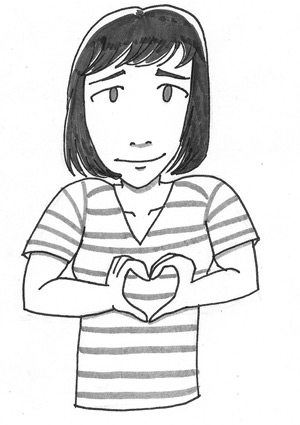Opening my mind
A few years ago I was at a friend’s house with three other friends. While we were outside a neighbor of hers, a woman who looked like she was in her 40s, walked over and asked if we wanted to go to the carnival with her. I thought she was being friendly but my friend politely said “no thanks.” I didn’t make much of it until the neighbor left and my friend told us, “Don’t talk to her, she’s bipolar.”
I had heard about bipolar disorder from TV and the news but I didn’t really know what it was. We went back inside my friend’s house and she told us that we should stay in there until her neighbor left. My friend made it seem like her neighbor was dangerous and I believed that we should stay away from her.
I never saw the lady again but when I got home I was so confused about what had happened that I decided to do my own research. I had always thought that people with a mental illness would be like what I’d seen on TV: moving their arms around, speaking quickly and loudly and talking to people who weren’t there. But it seemed like there was nothing wrong with her.
I looked up “what does it mean if someone is diagnosed with bipolar disorder?” WebMD was the first site that popped up. I found out that bipolar disorder is “a mental disorder marked by alternating periods of elation and depression.” It was the first time I had read in detail about a mental illness. Reading about the symptoms, like how they can go from being really depressed to really happy, I thought about how just meeting her for a few minutes it didn’t even go through my mind that she might have a mental illness. She seemed like just another neighbor to me. Maybe I had met someone with a mental illness before and I didn’t know it.
There was a section that said people diagnosed with bipolar disorder can lead a normal life and another on how family or friends should support them. It said not to treat them differently. After reading all the medical facts about bipolar disorder I didn’t think we needed to avoid her.
People with mental illness are going through a struggle and we shouldn’t judge them because of that. I knew how they must be feeling. My brother died when I was 8 and there were times I felt sad. But it’s not something they can get rid of as time passes by, like I did. It can be a longer struggle for them.
I didn’t think about mental illness much until 10th grade, when I heard that Demi Lovato was getting treatment for cutting herself, eating disorders and depression. In later interviews she said that during her treatment she was diagnosed with bipolar disorder.
I was surprised because she seemed to have it all but she had been suffering from an eating disorder since the age of 8 and had been cutting herself since she was 11. Demi had been in the spotlight from a young age and the pressure from that and being bullied about her weight in school affected her. She was one of my favorite singers so I decided to read more about eating disorders. I found out that someone with an eating disorder struggles to control their irrational thoughts, like in this case thinking that they’re fat but they look skinny to everyone else or feeling guilty after they eat. The same can be true for other mental illnesses.
We don’t know what others are going through
One day in 11th grade I was talking with a classmate when Demi Lovato came up. He said that he didn’t get how she could have gotten depressed just from the “stress” of touring. Right after he said that the bell rang so the conversation ended. When I thought about what he said, I realized he doesn’t know all the facts. Mental illnesses don’t happen overnight and someone could be rich and famous but that doesn’t mean they’re always happy. When I was depressed in middle school because I was grieving over my brother I didn’t show it and I didn’t talk to anyone about it except my parents.
The way we treat someone can have an impact on their life. A few months ago I was watching a TV series about an 8-year-old who was suffering from depression caused by bullying and his parents’ marital problems. He tried to end his life but fortunately he just broke his arm. The show made me wonder if I have ever unintentionally said something that hurt someone. I’ve heard teens joking around saying “stop being so emo,” but it could make the person feel bad if they’re going through something.
You may know someone who is struggling with something but you don’t know it because they’re ashamed to talk about it. Tell your friends “if you ever need me, I’m here” so they realize they can talk to you. People diagnosed with mental illness are just people and should be treated like everyone else.
l
Where to turn
If you are feeling depressed or having any kind of mental health problem and need someone to talk to, there is help. Counseling and other services are available. To find them:
Dial 2-1-1 to find social services in Los Angeles County, including counseling and mental health centers. Or search online at www.healthycity.org.
Call Teen Line at 1-800-TLC-TEEN (1-800-852-8336) to speak with a trained teen peer counselor from 6 to 10 p.m. or go to www.teenlineonline.org.
Call 1-877-7CRISIS (1-877-727-4747), an anonymous 24-hour suicide prevention hotline.
Call the California Youth Crisis Line at 1-800-843-5200 to get phone counseling, information and referrals. Or go to www.youthcrisisline.org to chat with counselors on Tuesdays from 4:30 to 10 p.m.
Call the Trevor Lifeline for gay and lesbian youth at 1-866-4U-TREVOR (1-866-488-7386) or go to www.thetrevorproject.org.
Go to the ReachOut forums, a website for people ages 14-25 to talk about what’s on their mind, at www.ReachOutHere.com.
l
This special package is funded by the Mental Health Services Act, Prop. 63
Think before you speak. Phrases like “stop acting bipolar” and “you’re so OCD” are insensitive.



